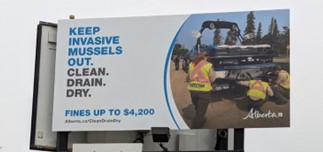Zebra and quagga mussels are not native to Canada and can wreak havoc on ecosystems and infrastructure. With growing concerns that invasive mussels could arrive in our province, Alberta launched the first Provincial Aquatic Invasive Species Task Force to identify ways to improve inspection, detection, response and education so that these dangerous species do not get established here.
Invasive mussels and other aquatic invasive species can be easily and inadvertently introduced, often by the movement of boats and other watercraft. These mussels might be tiny, but the negative impacts are massive. If invasive mussels became established inside Alberta’s borders, they could spread rapidly, clog waterways, upset lakes and other ecosystems and cause hundreds of millions of dollars annually in damages.
Alberta is currently free of invasive mussels and inspected a record number of boats and other watercraft in 2024 to help keep it that way. The task force has provided a set of recommendations to address the threat of invasive mussels while also strengthening Alberta’s prevention and early detection efforts.

Alberta launched an increased awareness campaign about invasive species in 2024 (Credit: Alberta government)
"Zebra mussels and other invasive species may be tiny but can cause massive damage. The work of this task force was vital for identifying ways to improve defense programs across our province, and we will continue to push the federal government to take this threat as seriously as we are. I’m grateful to the members for their time and expertise to help protect Alberta’s water infrastructure and rivers, lakes and waterways."
The provincial task force, led by Grant Hunter, MLA for Taber-Warner provided valuable advice on critical topics to strengthen the province’s aquatic invasive species programs. The team of experts also assessed strategies, including education and awareness, watercraft inspection and decontamination, monitoring, as well as the detection, response and management of current and emerging threats.
"The AIS Task Force did great work helping safeguard our waterways. It is critical that we keep quagga and zebra mussels out of Alberta’s waterways. Alberta has 70 per cent of Canada’s irrigation and it would cripple our irrigation farmers.”
Environment and Protected Areas will take these recommendations to determine priorities and how best to implement them ahead of the 2025 season to make sure Alberta stays invasive mussel free.
Aquatic Invasive Species Task Force members:
- Grant Hunter, Provincial AIS Task Force Chair and MLA for Taber-Warner
- Martin Shields, Member of Parliament, Bow River
- Kelly Carter, chief executive officer, Alberta Wildlife Federation
- Megan Evans, executive director, Alberta Invasive Species Council
- Patrick Hanington, professor, Environmental Health Sciences, University of Alberta
- Bradley Peter, executive director, Alberta Lake Management Society
- Richard Phillips, vice-chair, Alberta Irrigation Districts Association
- Richard Stamp, president, Stamp Seeds
- Jay White, director and vice president, Alberta Water Council
Quick facts:
- In 2024, Alberta conducted 13,408 watercraft inspections and 15 watercraft were confirmed positive for invasive mussels.
- Alberta’s Provincial Aquatic Invasive Species Task Force’s recommendations included:
- Implement a mandatory annual watercraft sticker initiative that provides visual proof of inspection.
- Pilot a decontamination dip tank for watercraft.
- Issue a Ministerial Order requiring mandatory watercraft inspections for all watercraft entering Alberta from eastern or southern provincial borders.
- Advocate to the federal government for more chemical options to treat aquatic invasive species.
- Establish a provincial eDNA monitoring program for aquatic invasive species.
- Create an invasive mussel-specific early detection and rapid response plan as well as an invasive mussel tactical plan.
- Conduct tabletop and field-based exercises for invasive mussel response training.
Related information
- Provincial AIS Task Force Recommendations Report
- Aquatic Invasive Species
- Watercraft inspections
- Clean. Drain. Dry.
- Letter from Alberta’s Environment Minister calling for increased federal action
Related news
- Keeping Alberta Invasive Mussel Free (March 28, 2024)
- New task force to stop invasive mussels at the border (May 15, 2024)
- Let’s keep ’em out of Alberta (June 12, 2024)
- Clean. Drain. Dry. (August 1, 2024)
- Record inspections to keep invasive mussels out (November 15, 2024)